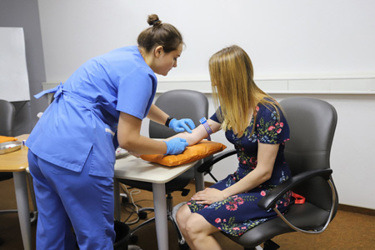Despite COVID-19, Patients Are Interested In New Trials

By Ed Miseta, Chief Editor, Clinical Leader

When the COVID-19 pandemic hit, the pharmaceutical industry was hit along with all others. Clinical trials are one component of that industry that is dealing with patient concerns, the workload at study sites, and stay-at-home orders. Several Big Pharma companies, including Pfizer, Merck, Eli Lilly and Company, Vertex Pharmaceuticals, and Bristol Myers Squibb have announced they will put a hold on the start of at least some new trials and halt recruitment efforts in others.
However, for patients enrolled in ongoing trials, bringing those trials to a standstill is not an option. For many patients, their very survival may depend on receiving their treatment. Those patients are also not averse to doing what is required of them. In a recent conversation with Craig Lipset, founder and advisor for Clinical Innovation Partners, I mentioned that some patients might be afraid of venturing out to a clinic. He quickly corrected me. “I don't know if I agree that patients are afraid to go to study visits,” he said. “My experience in pharma has led me to conclude that participants in trials tend to be pretty brave. Some have been advised to not go out due to public health warnings or stay at home orders.”
A new report from patient-recruitment company SubjectWell seems to confirm Lipset’s assessment. The company connected with sites and patients to learn how the uncertainty of the COVID-19 pandemic is impacting sites and the feelings of patients regarding their participation in clinical trials.
Ease The Patient Burden
Sponsors want to keep their trials moving forward, and sites want to continue conducting those trials. Both sides just want to make sure that doing so is safe and permissible. Between March 19 and March 23, 2020 SubjectWell surveyed 207 sites and 468 patients. The patients ranged in age from 18 to 60 plus.
The survey found 51 percent of patients surveyed have considered participating in a trial. Even though the survey was conducted at a time that most states were in the middle of stay at home orders, 57 percent of patients willing to participate in a trial indicated they would be willing to do so within the next month.
As you might expect, as long as the pandemic persists, most patients were in favor of services or choices that would provide them with the flexibility to participate in ways that are most convenient for them.
- 61 percent were in favor of telehealth services
- 51 percent would participate if on-site safety measures were heightened (such as temperature checks)
- 53 percent would use electronic diaries for study compliance
- 48 percent favored fewer office visits
- 59 percent were open to at-home lab collection kits
- 53 percent would allow at-home visits by qualified medical staff
Only 36 percent of patients interested in study participation were unsure of the time frame for participating, noting concerns over COVID-19. Of the patients surveyed, only 22 percent reported not being comfortable participating in clinical research due to the pandemic.
Sites Remain Onboard
The results obtained from sites were not very different from the patient perspective. A whopping 97 percent of sites, despite dealing with the pandemic and the requirements of trial protocols, reported they expect to continue with ongoing studies. Sixty-seven percent would continue with existing studies and also consider new studies, while 23 percent would continue with existing studies but at a limited capacity. Just 7 percent noted they would continue with existing studies only.
Because of their close interaction with patients, sites likely know better than sponsors what patients are thinking about their participation in trials. The survey notes 54 percent of sites reported they have not seen a change in patient willingness to participate in clinical research. That outcome may be based, in part, on actions sites are taking to protect visitors to their facilities.
Eighty-six percent of sites are implementing measures to keep potentially infected patients at home, while 83 percent already had protocols in place to keep potentially infected staff members out of the office. At the time of the survey, 33 percent of sites already had contingency plans in place to deliver patient care at home if deemed necessary, and 47 percent were already in discussions with sponsors and IRBs about potential protocol deviations, as discussed in recently released guidance from the FDA.
The following additional feedback was gained from sites and patients surveyed:
- Sites indicated they are vigilant in following CDC and WHO guidelines, as well as guidelines from local authorities.
- Most patients are being screened over the phone for COVID-19 symptoms before being approved to come to the site for their visit.
- Sites are limiting the number of patients allowed in a clinic at any given time.
- Most importantly, sites recognize that patients may have heightened emotions and concerns due to the pandemic, and it has become even more critical to treat them with empathy and respect.
SubjectWell notes it will continue to administer these surveys at regular intervals, so as to monitor the pandemic and the industry’s response to it.
There are other signs of trials potentially getting back on track sooner rather than later. Medidata reports two countries, China and Argentina, are already seeing improvement in patient enrollment. In the month of March 2020, China saw a 68 percent year over year decrease in new patients entering trials. However, in looking at new patients added, the numbers in China were still 240 percent higher in March than they were in February.
For more information on the survey, you can reach out to SubjectWell at covid19@subjectwell.com.
